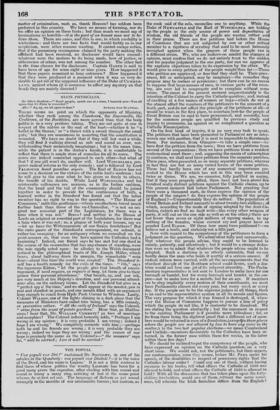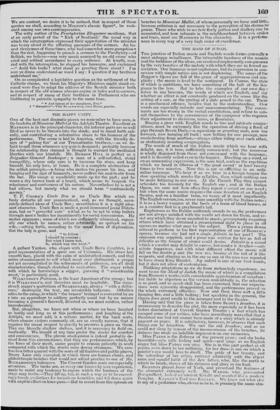VOX POPULI.
" Vox populi vox Dei !" exclaimed Dr. SOUTHEY, in one of his articles in the Quarterly: vox populi vox Diaboli !—it is the voice of the Devil, and his name is Legion." It is not a little curious to find those of whose politics the worthy Laureate has been for a good many years the expositor, after circling with him round and round in many a mazy ring, arriving at last at the same point whence he at first set out. The language of Reform as yet sound strangely in the mouths of our aristocratic barons ; but custom, as the cook said of the eels, reconciles one to anything: While the Duke of NEWCASTLE and the Earl of WINCHILSEA are holding up the people as the only source of power and depositaries of wisdom, the old friends of the people are waxing rather cold in their praise. There are few petitions laid before the House of Commons that are not subjected by one or other critical member to a rigidness of scrutiny that used to be most heinously inveighed against when the prayers of these people ran in a different strain. We, who are lookers-on amidst the changes of opinion, must confess that we do not entirely trust to the sudden zeal for popular judgment in the one party, nor can we approve of the captious objections taken to its expression by the other. We would give to every petition of the people weight thus far :—Those- who petition are aggrieved, or fear that they shall be. Their griele, ances, felt or anticipated, may be imaginary—the remedies they propose may be useless or pernicious ; but there can be no reason to suppose that large masses of men, in various parts of the coun- try, are ever led to congregate and to complain without some cause. The cause at the present moment unquestionably is the intention of the Cabinet to carry the Catholic question ; and, instead of cavilling at a few names of women or boys—which do not at the utmost affect the numbers of the petitioners to the amount of a tenth part, and do not affect the principle of the petitions at all—it would be wiser, in the first place, to ascertain, how far the people c{ Great Britain can be said to have pronounced, and secondly, how far the common people are qualified by previous study and inquiry to pronounce, an opinion on so complicated a question as Catholic Emancipation. On the first head of inquiry, it is no very easy task to• speak. The petitions that have been presented to Parliament are so inter-• woven one with another, that it is next to impossible to disentangle them. For instance, from Glasgow—to take a simple case —we. have first the petition from the town ; then we have petitions from several of the corporations ; then we have petitions from a resident ecclesiastical court there ; and, supposing the mania of subscription to continue, we shall next have petitions from the separate parishes, These pass, when presented, as so many separate petitions, whereas in fact they are but so many varied forms of the same petition. There has hardly been one of any numerical importance pre- sented to the House which has not in this way been counted twice or thrice. We are, we conceive, fully justified in saying, that if they were properly sifted, there have not been above five hundred really distinct petitions against the Catholic claims, up to this present moment laid before Parliament. But granting that there were a thousand such, do these express the opinion of the people of the empire ? do they express the opinion of the people of England ?---Unquestionably they do neither. The population of Great Britain and Ireland amounts to about twenty-two millions; of which, according to the mode of signing adopted by the Anti-Ca- tholics, (which we find no fault with—like every other weapon of party, it will cut on the one side as well as on the other,) there are not fewer than seven or eight millions of signing males, to say nothing of the females; whose earnest cry and prayer have so puzzled Lord ELDON. Of these how many have petitioned ?—we believe not a tenth, and certainly not a fifth part. Now with regard to the competency of the petitioners to form a judgment on the question. We admit nfost fully and unreservedly, that whatever the people advise, they ought to be listened to• calmly, patiently, and attentively ; but it would be a strange deduc- tion were we to admit that whatever the people advise ought to be adopted. Such a doctrine is so utterly untenable, that we can hardly deem the man who holds it worthy of a serious answer. If radical reform were carried, with all the accompaniments that the sturdiest disciple of the Bentham school could desire, such a doc- trine would not lose one jot of its inherent absurdity. The Parlia- mentary representative is not sent to London to make laws for one borough or hamlet, but for every borough and hamlet in the em- pire—not to make laws for a month, but for an age. If members are to obey implicitly every motion of their constituents, we must have Parliaments chosen not every year, but every week or every day. If the people are to be the supreme judges in all things, there is an end to the representative system in all its moods and figures. The very purpose for which it was framed is destroyed, if, when- ever the House of Commons happens to pursue a line of policy which the people do not like, it is instanter to be dissolved. We are stating the question abstractly ; but the argument in respect to the existing Parliament is if possible more ridiculous ; for, so far from there being the slightest proof that a different set of mem- bers would be returned in case of a dissolution,(exeeptlin those places where the people are not allowed by law to have any voice in the matter,) in the two last popular elections—we mean Cumberland and Carlisle—members favourable to the Catholics have been re- turned, in the former case within these few weeks, in the latter within these few days ! We should be inclined to put the competency of the people, who have expressed an opinion on the Catholic question, on a very short issue. We would ask, not the petitioners, but their organs, our contemporaries, were they aware, before Mr. PEEL spoke his speech, of the disabilities in respect of possessory rights that the Catholics labour under? Could any one of them, without having recourse to his hooks, tell what offices the Catholic of 1688 was allowed to hold, and what offices the Catholic of 1829 is allowed to hold? With all the discussion that has taken place upon the forty- shilling freeholders, could one of them, without the same assist- ance, tell wherein the Irish franchise differs from the English ? We are content, we desire it to be noticed, that in respect of these queries we shall, according to MILTON'S classic figure*, be reck- oned among our own contemporaries. The witty author of the Presbyterian Eloquence mentions, that at an early period of the " Kirk of Scotland," the usual way in which the congregation expressed their approbation of the minister was to cry aloud at the affecting passages of the sermon. An ho- nest clergyman of those times, who had somewhat more gumptiont than the rest, happening to preach a sermon to the Presbytery—of Selkirk, we believe—was very much annoyed by an old crone who cried and sobbed accordance to every sentence. At length, wea- ried with the interruption, he stopped his harangue, and exclaimed —" Auld fule bodie ! what stand ye greeting there about? I'm sure ye dinna understand ae word I say : I question if my brethren understand me."
On so complicated a legislative question as the settlement Of the Catholic claims, we think his Majesty's Ministers might stand ex- cused were they to adopt the address of the Scotch minister both in respect of the old women who are crying in holes and in corners, and in respect of many of their brethren in Parliament who are blubbering in patriotic sympathy to the same tune.
" * And fairest of her daughters, Eve." f " Gumption"—Vide BLACK" W 0 OD, voce Hoc°, passim.

















 Previous page
Previous page